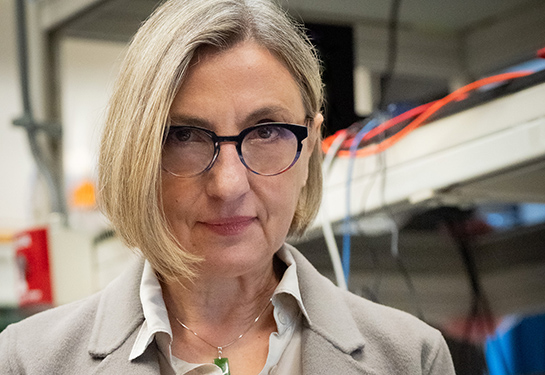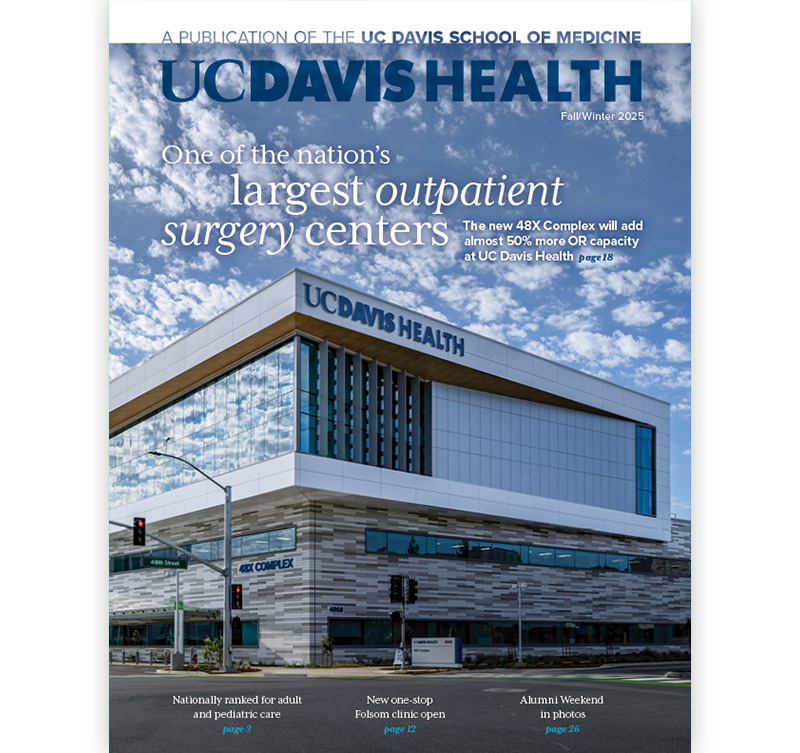Early-stage trial finds stem cell therapy for retinitis pigmentosa is safe
A team of UC Davis Health researchers has shown that CD34+ stem cells can be safely administered into retinitis pigmentosa (RP) patients’ eyes and may offer therapeutic benefits. The phase 1 trial also confirmed that these specialized cells can be readily isolated from the patient’s own bone marrow. The study was published in the American Academy of Ophthalmology journal, Ophthalmology Science.
“It was a small study, and we wanted to show we could effectively isolate the CD34+ cells from bone marrow, inject them safely and perhaps see some visual benefits,” said Susanna Park, professor in the Department of Ophthalmology and Vision Science and first author on the paper. “We found the treatment is safe, and four of the seven patients showed measurable improvements in vision.”
A disease with diverse roots
RP is caused by as many as 100 different genetic mutations. As retinal cells die off, people lose peripheral vision and the ability to see in low light, ultimately progressing to complete blindness.
Because RP genetics are so complex, correcting the root cause is challenging. One existing gene therapy for RP is only effective in the 1% of RP patients who have that specific mutation. Other gene therapies are in development; however, each one could help only a small group of patients with RP.
Seeing this disease diversity, the UC Davis team took a different, mutation-agnostic approach. Rather than trying to correct the underlying genetic anomaly, they began investigating whether stem cells could regenerate retinal tissue and vision.
CD34+ stem cells are particularly promising because they home in on damaged tissues to repair them. These regenerative cells have been tested in cardiovascular diseases and have shown significant benefits. Previous UC Davis studies, in both animal models and patients, have shown this approach could improve RP and possibly other retinal conditions.
“We believe the CD34+ cells find the degenerating retina, grab onto it and could generate molecular changes to reduce the degeneration,” Park said. “We showed some preservation of retinal function using these stem cells in one of our animal models of RP.”

A safe and possibly effective therapy
Researchers recruited seven people with RP, who had lost most of their peripheral vision. They used a sterile, good manufacturing practices laboratory at the UC Davis Institute for Regenerative Cures to isolate CD34+ cells from bone marrow obtained from each participant. Study participants received a single stem cell injection in one of their affected eyes.
The study showed the therapy was well tolerated: One patient had a minor complication, which corrected itself within 24 hours. Overall, the stem cell isolation process produced safe, high-quality cells.
“The most important result is that we were able to isolate the CD34+ cells of high quality for eye injection,” Park explained. “Around 90% of the isolated cells were viable, and there were no infections or other serious adverse effects after cell injection in the eye.”
While this phase 1 study focused mainly on safety, most participants felt their vision had improved, and objective eye tests confirmed this. The UC Davis team plans to pursue a larger safety and efficacy trial in the future.
“After a decade of collaborative studies testing the human CD34+ cells in mouse models of retinal degeneration, it is very promising to see their safety and potential efficacy in patients who have enrolled in the clinical trial,” said Jan Nolta, coauthor on this study. Nolta is the director of the Stem Cell Program and the UC Davis Gene Therapy Center in the Institute for Regenerative Cures at UC Davis Health.
Other authors included Gerhard Bauer, Brian Fury, Mehrdad Abedi, Nicholas Perotti and Dane Colead-Bergum.
The study was funded through: Retina Society Research Award; Cures within Reach Grant; Barbara A. & Alan M. Roth, MD Endowed Chair from University of California, Davis.
Learn more about our ophthalmology expertise
The UC Davis Eye Center
The UC Davis Eye Center provides world-class eye care, pioneers collaborative vision research, and trains the next generation of specialists and investigators to become leaders in the Sacramento region and beyond. The Eye Center team aims to transform vision care and develop cures for blinding eye diseases, from cornea to cortex.





